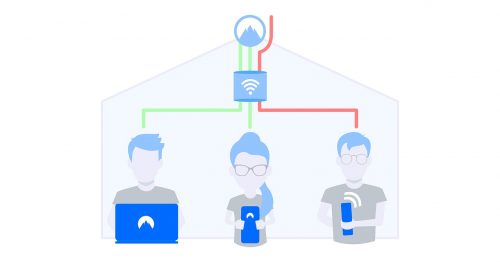Which VPN service is reliable in 2019?
Test winner: NordVPN Fast & Unlimited
 NordVPN secures the test victory with consistently convincing performances. In addition to the connection speed, the many great functions were particularly convincing. Hardly any delays in the creation of the website, short response times, high security standards and exemplary ease of use have earned the Fast & Unlimited service from NordVPN the test victory („good“, 1.8) among the PC VPNs (price per year: 73.74 euros). The Panamanian-based provider secured first place with consistently convincing performance, and these points were particularly well received in the test:
NordVPN secures the test victory with consistently convincing performances. In addition to the connection speed, the many great functions were particularly convincing. Hardly any delays in the creation of the website, short response times, high security standards and exemplary ease of use have earned the Fast & Unlimited service from NordVPN the test victory („good“, 1.8) among the PC VPNs (price per year: 73.74 euros). The Panamanian-based provider secured first place with consistently convincing performance, and these points were particularly well received in the test:
Powerful connection: With 5,068 servers in 60 countries at the time of the test, there is an ample choice of locations. Users of streaming services are well supplied and do not have to do without Netflix, Spotify and YouTube even on holiday. However, Sky is not supported. If you want to be anonymous when you pay, you can use traditional payment methods such as credit cards, PayPal, Skrill or Sofortüberweisung as well as crypto currency (e.g. Bitcoin).
The price-performance winner comes from Bitdefender: The VPN service offers a good overall value for money.
In the test field the Bitdefender Premium VPN with a satisfactory test score of 2.8 was only at the bottom of the league. Few additional functions, partly uncomfortable operation and longer delays in website construction were the decisive factors for the moderate overall score. But for the very reasonable price of 29.99 Euro per year Bitdefender offers a decent overall package.
What does a VPN service do?
VPN providers provide a service with a VPN security protocol that can encrypt all data traffic and at the same time disguise your identity on the Internet. For this purpose, users establish an encrypted connection to the VPN provider. The VPN replaces the customer’s IP address on the Internet with his own, so that the user’s identity on the Internet can no longer be determined on the basis of this combination of numbers. If VPN services are used correctly, it is possible, according to the providers, to conceal data traces and transmitted content on the Internet to a large extent, so that, for example, monitoring activities such as data retention run into nothing. VPN connections also make life difficult for hackers looking for unencrypted, sensitive data such as passwords. Strictly speaking, VPN services are privacy protection services.
How does a VPN work?
On the Internet, a VPN provider is a kind of representative for your activities – for example, when calling up websites. Your IP address, which uniquely identifies you on the Internet, cannot be recognized, and the transmitted data is encrypted. And this is how it works technically:
- Your device(s) with VPN software: The VPN software provides the connection to the provider. All data traffic then runs through the program.
- VPN server: The VPN provider’s server calls up the pages for you and forwards the results to you.
Internet: The visited pages only see the IP address of the VPN server and cannot find out your real address.
Who needs a VPN service?
 If you have nothing to hide, you don’t have to hide anything! With this argument, many people dismiss the call for more anonymity on the Internet. But that is not enough. Those who use a VPN service do not necessarily want to hide something, but often just protect their privacy – just like in real life. And that goes without saying. Or would you tolerate strangers in your living room, listen to conversations, flip through photo albums, browse files and study your everyday habits? Privacy on the Internet is just as worth protecting. Pharmaceutical companies, for example, don’t care what diseases someone Google searches for. And the employer is also not interested when an employee looks for other vacancies. But all this can be spied on quite easily without adequate privacy protection on the Internet.
If you have nothing to hide, you don’t have to hide anything! With this argument, many people dismiss the call for more anonymity on the Internet. But that is not enough. Those who use a VPN service do not necessarily want to hide something, but often just protect their privacy – just like in real life. And that goes without saying. Or would you tolerate strangers in your living room, listen to conversations, flip through photo albums, browse files and study your everyday habits? Privacy on the Internet is just as worth protecting. Pharmaceutical companies, for example, don’t care what diseases someone Google searches for. And the employer is also not interested when an employee looks for other vacancies. But all this can be spied on quite easily without adequate privacy protection on the Internet.
Using VPN services correctly
It is a prejudice that VPN services are primarily intended to conceal illegal activities, for example on file-sharing networks. For users with a little skill, however, a VPN offers the possibility of circumventing a few restrictions: For example, VPN connections can be used to override geographical barriers, i.e. access restrictions based on location. According to the law, the virtual change of location via VPN is not prohibited, but it often violates the general terms and conditions of shopping sites or streaming services, for example. Anyone who can live with the risk of being excluded from a service as a result of such a violation can use VPN, for example, to watch domestic TV offers abroad.
Surfing the Internet anonymously with restrictions
Many people interested in VPN access have one big wish: complete anonymity. But this cannot be achieved one hundred percent. Although it is much more difficult to establish identity with a VPN connection, it is usually not completely impossible. Because when surfing the Internet, data always accumulates at different points: Tracing the following traces back to a specific person is immensely time-consuming – but still feasible.
- Provider data: If you use an encrypted VPN access that later exchanges your own IP address, you can tell your Internet provider when you are using which service. Even if VPN does not make it possible to trace what the user is doing on the Internet, there are supposed to be secret services that are suspicious even because a surfer is on the Internet via VPN services – true to the motto: Whoever conceals their activities must have something to hide.
- Data while surfing: The VPN server conceals the unique IP address. But there are many other identification features that are less clear individually, but in combination are quite treacherous. These include, above all, so-called OS and browser fingerprinting. This is meta information such as the operating system used, browser versions and settings, and window sizes. If you want to hide such data, you need further software like AntiBrowserSpy.
- Data from the VPN provider: Almost all vendors claim that they do not store any user data at all. Many services, for example, advertise the absence of log files. From a technical point of view, this is hardly possible and therefore implausible.
Decisive: Speed and convenience
 All this shows that a good or bad VPN service cannot necessarily be determined by where the provider has its headquarters. Monitoring works globally. That’s why criteria such as the number and choice of server locations, connection speed and availability, as well as the ease of use and functional scope of the PC client and smartphone apps are important when choosing a VPN provider. Also important: Is the number of connectable devices or the data volume limited?
All this shows that a good or bad VPN service cannot necessarily be determined by where the provider has its headquarters. Monitoring works globally. That’s why criteria such as the number and choice of server locations, connection speed and availability, as well as the ease of use and functional scope of the PC client and smartphone apps are important when choosing a VPN provider. Also important: Is the number of connectable devices or the data volume limited?
Only SpyOff and Perfect Privacy offer unlimed device usage. With CyberGhost, for example, simultaneous use is limited to seven devices.
Test conclusion: VPN services in comparison
There are no huge differences between the VPN providers in the test. We have already sorted out dubious offers in advance. All test candidates are at a comparatively high level. That’s nice, but it doesn’t make the decision for or against a provider any easier. NordVPN won the test thanks to the best combination of functionality and convenience, comparatively high security standards and strong performance. Bitdefender is the last in the comparison, but still the price-performance winner, because it offers a decent performance at an affordable price.
Posted in News by Allan with comments disabled.